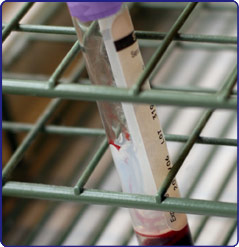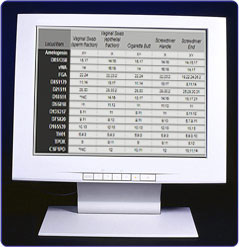Judges
Presiding over a case that involves DNA evidence is a challenge that requires thorough knowledge of constitutional rights, science, police procedure, and the management of discovery and expert witness issues. This module will address the pretrial and trial aspects of these issues.
Pre-Trial
Statutes of Limitation
Case law is continually responding to the developments and applications of forensic DNA. For example, courts have held that DNA evidence is legally sufficient to convict even without identification of the accused by a live witness.
Expert Assistance
The evaluation of DNA test results may require expert assistance. An expert can educate and advise the defense team, and possibly serve as a witness. If the defendant is indigent, an expert can be obtained by motion to the court requesting funding for such assistance.
Input From an Expert
An expert for the defense can help with complex and technical matters, such as:
- Interpreting the prosecution's laboratory report and underlying data
- Determining whether there were problems with the laboratory analysis and/or evidence handling
- Evaluating the need for independent testing and observing additional testing procedures.
- Offering testimony at trial
- Preparing counsel for the presentation of DNA evidence at trial
- Determining whether to challenge the admissibility of newer DNA technologies
Financial Assistance
A defendant has a constitutional right to expert assistance financed by the court or prosecuting county. This right is not absolute; there will be an assessment of the probable value of the assistance sought and the risk of error if such assistance is not obtained. Thus, the defense motion needs to detail the client's indigent status and the specific reason(s) the expert assistance is required.
Defense Testing
The defense may request testing of items not yet tested by the prosecution or the retesting of items already examined by the government. Such requests must be evaluated on a case-by-case basis with reference to the defense proffer of why each test might provide exculpatory evidence. The court should also be aware of backlogs in local law enforcement DNA labs and the need for appropriate prioritization of testing requests.
Discovery
The trial judge must ensure that both discovery rules and constitutional due process obligations for disclosure of material are honored. This may include reports, notes, chain-of-custody documentation, written correspondence, results and lab personnel curricula vitae. Other materials needed may include validation studies, proficiency test results, contamination incidents and corrective actions, and accreditation status. These may often be reproduced by the lab in electronic file format. In a particular case, disclosure of the database used to derive match probabilities may also be appropriate.
Victim/Defendant/Third Party Sample Orders

If reference samples are needed, they must be obtained by consent or by lawful process. At a minimum, reasonable suspicion must exist before a court may order a third party (or a suspect not yet under arrest) to provide a DNA sample. In some instances probable cause will be required.
Discovery by the Prosecutor
In cases where the defense might present DNA evidence, the prosecution may file a discovery request as well. Specific discovery requests may include reports, notes, chain-of-custody documentation, written correspondence, results and lab personnel curricula vitae. Other materials needed may include validation studies, proficiency test results, contamination incidents and corrective actions, and accreditation status.
Sample Testing

In some jurisdictions, after a defendant has been charged, the prosecution is required to preserve evidentiary biological material for the purpose of DNA testing by the defense. This can prove challenging especially if existing biological material is too small to conduct two separate tests (one for the prosecution and one for the defense).
Dividing Samples
Judges may require the prosecutors to consult with the laboratory on the feasibility of dividing the sample. State law may require prosecutors to inform the defense that the sample is too small and to seek the court's permission to consume the entire sample in testing.
Continuances
Requests for a trial continuance must be assessed on a case-by-case basis with regard for certain considerations.
Prosecution Motion
For a prosecution motion, a judge should assess:
- The timeliness of the motion
- The need(s) for further testing or evaluation
- The good faith of the motion balanced against the right of the defendant to a speedy trial in order to avoid unwarranted restraints on liberty
Defense Motion
For a defense motion, a judge should assess:
- The timeliness of the motion
- Whether prosecutorial delay in disclosure contributed to the need for further preparation or investigation
- The good faith of the motion, all balanced against the court, government, victim, and public need for a speedy resolution of a criminal charge
Motions In Limine
The defense may challenge the admissibility of the DNA evidence under either the Frye or the Daubert standard. Both Frye and Daubert challenges may address:
- The reliability and general acceptance of the underlying scientific principles, techniques and methodologies
- The application of the methodologies to the case at issue
In some states, the laboratory's performance and compliance with appropriate standards and controls in the case at hand may also be challenged.
Video (01:00)
Additional Admissibility Issues

Other issues that may be appropriate for resolution by motion in limine in a forensic DNA case can include:
- Precluding reference to the suspect's DNA profile having been in an offender database
- The admissibility of low-random-match probability evidence
Trial
Voir Dire
The extent and scope of voir dire will depend on the individual jurisdiction and the particular trial judge. During voir dire in a case involving DNA evidence, the court should consider permitting inquiry that will allow the parties to gauge a potential juror's educational background and understanding and comfort level with scientific concepts. Understanding the jury panel's level of education and scientific expertise will assist the parties in tailoring their presentations to maximize the jury's ability to understand the expert's testimony.
Video (02:44)
Potential Juror Questions
Depending on the rules of the jurisdiction, the court may wish to consider the following voir dire questions:
- Have any panel members had particular training, education or experience in biology, chemistry or statistics?
- Have any panel members read books, articles or magazines on DNA analysis methods?
- Would any panel members be unable to consider the case fairly because of something they have seen in the media or on such television shows as CSI or Law and Order? Is there anyone on the panel who believes that the techniques that they have seen on television are techniques that can always be performed by any law enforcement agency in a real case?
- Do any panel members have strong opinions for or against DNA?
Opening Statement
A trial judge may impose reasonable time limitations on an opening statement; limits may also be placed on the use of exhibits or demonstrative evidence. Both openings should be restricted to what the parties intend to prove (or, for the defense, what the evidence will fail to prove) and may not be argumentative in nature.
Evidence Presentation
Trial judges have the authority under Fed. R. Evid. Rule 611 or its state counterpart to exercise "reasonable control" over witness interrogation and the introduction of evidence in order to make the presentation effective.
In a forensic DNA case, “reasonable control” may include (subject to the jurisdiction’s governing law):
- Note-taking by jurors
- Allowing jurors to pose questions
- Allowing the use of multimedia exhibits (such as PowerPoint presentations) and providing jurors copies of any presentations
- Curtailing the excessive use technical jargon and ensuring a "plain English" comprehensible presentation
Potential Hearsay
Judges must also be aware of potential hearsay/Confrontation Clause issues involving DNA reports and the particular jurisdiction's rules governing the manner of presentation of expert opinion testimony.
Jury Instructions
Jury instructions should include the jurisdiction's standard charges concerning expert testimony and how it is to be evaluated. In particular cases, judges may need to consider providing instructions on problematic issues such as the "prosecution fallacy," the "defense fallacy," or the "CSI effect."
Video (01:09)
Closing Argument
Closing arguments in forensic DNA trials involve all of the issues that arise in a typical criminal case, and potentially some additional ones. Issues that may be of concern in a DNA case include:
- Prosecution fallacy
- Defense fallacy
- Probability of guilt/innocence
- Comments on the failure of the defense to call experts or retest or refute the prosecution evidence
Presiding over DNA-related cases requires knowledge of issues, precedents and jurisdictional law specific to DNA evidence. Judicial oversight and authority play an important role that directly impacts officers of the court and jury members.
As illustrated in this case study, DNA evidence can present scientific and legal complexities that have a profound impact during trial preparation and courtroom proceedings. A thorough understanding of scientific DNA analysis methods aids in determining the significance and value of biological evidence. Understanding legal issues that may be encountered when presenting case-related DNA evidence is helpful in developing effective courtroom strategies. Through practical examples presented in this case study, officers of the court can gain valuable insight into the powerful role DNA evidence plays in prosecuting the guilty and exonerating the innocent.


